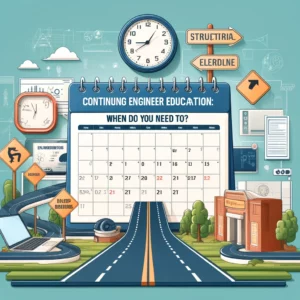Professional Engineering Continuing Education
Are you a licensed engineer? Are you wondering when it will be time to start your continuing education?
Believe it or not, you’ll need to continue taking courses in order to maintain your engineer license. Continuing education for engineers is an important part of your professional experience.
Here’s what you need to know about continuing engineer education.
When Do You Need Continuing Engineer Education?
Continuing education requirements for renewing your license will vary depending upon the state you live in.
For example, in Florida, you must take at least eighteen hours of continuing education every two years. At least one hour of this must relate to state laws and regulations. One other hour must be dedicated to ethical issues.
At least four hours of your eighteen must relate to a specific area of practice, and the other twelve can be devoted to topics of the engineer’s choice. The hours are required in order for your license to be renewed.
In Michigan, professional engineers must complete at least fifteen hours of continuing education for their first renewal. After they’ve been working for two years, they can complete thirty hours of professional development every two years.
In Pennsylvania, you’ll need to complete twenty-four hours of professional development every two years. You can also carry up to twelve credits over into the next renewal period.
It’s important to check with your state about requirements for professional development hours. Chances are, you’ll need it in order to maintain your professional licensure in your field.
Why is Continuing Education Important For Engineers?
Continuing education is important in any profession. With engineering, however, it takes on a special significance. The field of engineering is always changing, and you’ll want to grow along with it.
Rules and technologies in engineering are developing all the time. Professional development helps you stay on top of all of the latest serialization rules and industry developments. Continuing education can also help you to develop new skills that will keep you on the cutting edge of your field.
In addition, continuing education can help you make some new contacts in your industry. You’ll get to participate in seminars, presentations, or other events that will allow you to branch out.
Networking isn’t only important when you’re looking for a new job. It gives you a field of contacts you can reach out to for information or expertise.
You can also use your time with continuing education to find a mentor. This could be someone who has been in the profession for years and can give you guidance in terms of developing your skillset or reaching the next level.
Once you’ve met someone who you think might be a good mentor, make the effort to develop a relationship. Ask for advice on projects or take them out to lunch. The right mentor can help you make good decisions as you look to advance your career.
What Courses Are Available for Continuing Education?
Your state may have requirements as to the types of courses you should be taking. They’ll probably also have a number of hours you can complete on any engineering topic. It’s also important to consider your area of expertise and how you can build your knowledge.
All engineers, for example, may be required to take a course on ethics and professional conduct. However, civil engineers may be interested in learning more about pavement design, soils, or watersheds.
Mechanical engineers may want to take courses on fluid flow, piping, pump basics. Electrical engineers can develop their understanding of circuits, generators, and motors. Your continuing education can help you to become more of an expert in your field, and make you even more confident in your knowledge base.
In today’s world, traveling to seminars is no longer a necessary part of continuing your education. In fact, many companies offer live or on-demand webinars that you can complete on your own time. When you’ve got a busy professional life or a family, this can be a wonderful way to stay on top of your field without having to spend time traveling.
How Should You Choose Continuing Education Courses?
Your continuing education is an opportunity you won’t want to waste. Choosing the right courses for you will depend upon a number of factors.
Sometimes, a co-worker or mentor will be able to recommend an excellent webinar or company. Many organizations are also willing to reimburse you for your continuing education. Find out what your employer is willing to chip in before you begin your learning.
Consider your goals as an engineer, as well as the types of projects your employer or clients assign you to. Would you love to brush up on your knowledge of soils? Would it help you to know more about road tunnels?
Some continuing education companies also offer packages tailored toward your engineering specialty, as well as your state. If you’re looking for a cost-effective way to meet your requirements, this can be a great option. It also saves you the trouble of wondering whether certain classes will “count” toward the regulations in your state.
Always Learning
Continuing engineer education is probably required in your state. If you’re serious about maintaining your engineering license, you’ll need to sign up for some continuing education classes that will give you an advantage in your field. They can help you strengthen your skillset and make important connections with other professionals.
Don’t stop getting smart about your continuing education now. For excellent continuing education webinars and packages in the field of engineering, contact us today.
